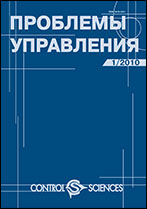|
Control in the socio-economic systems
A self-organization model for autonomous agents in a decentralized environment
Z. B. Sokhova, V. G. Red'ko
Scientific Research Institute for System Analysis, Russian Academy of Sciences, Moscow, Russia
Abstract:
A self-organization model for autonomous agents operating in a transparent decentralized environment is developed and investigated. Transparency means that all information about the environment and the agents' community is open. Each agent informs the entire community about his current resources and intentions. The environment consists of cells, and during operation, each cell can generate a new resource using the resources received from agents. Each agent is also aware of the efficiency and resources of the cells. The agent-based approach is adopted to consider the efficient allocation of agents' resources over cells and analyze different resource allocations. Each agent acts rationally based on his goals. An iterative resource allocation method is proposed, in which the agents exchange information to make their decisions. Computer simulations are carried out for several modes of operation: 1) without training but with iterations, 2) with training and iterations, 3) without training and iterations, and 4) with training but without iterations. As indicated by the simulation results, the total resource of the agents' community is significantly higher in the model with training and iterations; due to self-organization and training, the agents are distributed so that their number in each cell is small. According to the experimental evidence, learning works only in combination with iterations.
Keywords:
multiagent systems, self-organization, decentralization, transparent environment.
Received: 01.12.2020
Revised: 15.02.2021
Accepted: 24.02.2021
Citation:
Z. B. Sokhova, V. G. Red'ko, “A self-organization model for autonomous agents in a decentralized environment”, Probl. Upr., 2021, no. 2, 42–51; Control Sciences, 2 (2021), 29–37
Linking options:
https://www.mathnet.ru/eng/pu1231 https://www.mathnet.ru/eng/pu/v2/p42
|

|




 Contact us:
Contact us: Terms of Use
Terms of Use
 Registration to the website
Registration to the website Logotypes
Logotypes








 Citation in format
Citation in format 